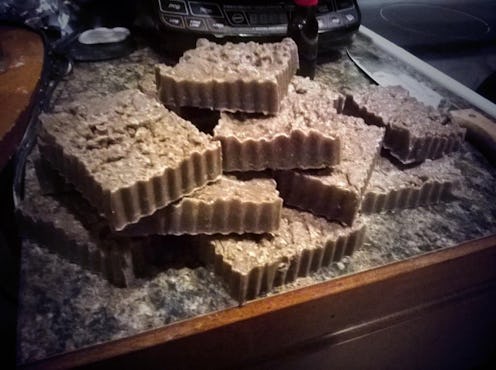
When I first decided to throw out my cheap, liquid soaps found at every drugstore across the country, I tried out a variety of Trader Joe's bath products until I found Shea Moisture's African Black Soap. And then, my skin was absolutely in love. For me, Shea Moisture's African Black Soap quickly became the best natural body wash on the market today. Even though I had no idea what African black soap actually was, I happily shelled out between $9.99 and $12.99 (depending on which store I was shopping in) each month for 13 ounces that barely got me through each month. But it was a cheap cost for smooth, toned skin, in my opinion. Plus, when you added up the price of time spent investigating a way to prevent and heal hormonal acne and my quest for long, natural hair... well, let's just say I grew less and less concerned about forking over that $10 bill.
Though the cost wasn't excessive, the fact that I was constantly in need of a new bottle meant I had to rally myself to get on a subway and plow through crowded subway terminals and streets, just to find out that the store was out of my preferred soap. Needless to say, not being able to get ahold of your favorite natural body wash would make any natural beauty go absolutely insane.
But let's get back to the subject of that highly coveted Black soap. It's made from the ashes of nourishing plants, typically plantain skin, cocoa pods, palm leaves, and oil. The leaves are first sun-dried and then roasted in a pot, after cooking at a stable temperature. Nourishing oils are then added to make the soap have incredible healing properties before it's left to set for about two weeks.
Just like cocoa butter or shea butter, the process is slow and important — the process preserves the nutrients that we all want our skin to be drinking up liberally each day. For centuries, black soap has been used by natives of Nigeria and Ghana to alleviate both common and uncommon skin ailments. Since plantains are a main ingredient in black soap and are found naturally in South American and Africa, you can best believe that companies are ditching this extraordinary ingredient to make their product on the cheap. But don't buy those knock-offs. One thing to keep in mind is that soap cannot be made without lye — black soap has naturally occurring lye from the ashes of plantains.
Despite my shopping issues, authentic raw black soap can be purchased easily at your local beauty supply store (depending on where you live) and on-line for a fraction of the cost of OTC soaps that contain additional ingredients. This soap is not going to look like a fancy bar soap you've purchased at a local farmer's market either — this earthy-scented bar will usually be bumpy and cut in various shapes. This soap can be melted down easily over a stove-top in order for you to custom-make your ideal body wash with essential oils that are specific to your beauty woes and not the masses.
Here's the thing: If you find a bar of black soap from what appears to be an authentic source, you still should perform a quick search on the brand. One common, scary, complaint is that raw soap from unreliable vendors can contain debris and wood chips — and those are things you should never put on your naked body. According to Multicultural Beauty's website, one costumer even complained about finding hair in the raw black soap... and it definitely wasn't hers.
Scary things aside: Nubian makes an amazing raw soap that I've NEVER found anything but those healthy ashes in. And now that you know what black soap is, let's talk about all the reasons you need to ditch that ol' bottle of Dove body wash for some serious cleansing. Because black soap:
- Protects Against Free Radicals
- Is Excellent Source of Antioxidants
- Improves Skin Tone
- Fights Against Pre-mature Aging
- Controls, Prevents, and Heals Body Acne
- Fades Dark Spots from Sun, Acne, and Mosquito Bites
- Reduces Inflammation of Pimples and Razor Burn
- Nourishing, Exfoliating Properties
So, start searching.
Image: Giphy; Hafiz Issadeen / Dario - Jacopa Lagana'/ Flickr